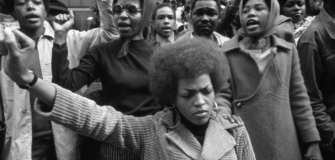Pleasure Is Not Optional
Share
Pleasure isn’t a luxury. It isn’t an escape from survival. It’s not something you wait to receive after proving your worth or enduring enough struggle. Despite the messages that have been told to Black cis women, Black trans women, Black femme identifying people and Black non binary individuals, pleasure isn’t an accessory or (for a limited time) add-on. It’s not a reward. It’s part of your right to be well.
Still, we live in a world that often tells us otherwise. Pleasure for Black people is frequently ignored, pathologized or distorted. It’s shaped by legacies of exploitation, misogynoir, respectability politics and the policing of our bodies. We are taught to question our desires, to perform (or hide) pleasure because of someone else’s desires or to suppress it entirely.
This is a reframing and a reminder that pleasure is not separate from wellness. It is a part of how we survive, how we thrive and how we stay connected to ourselves. Not as a final step in healing, but as a starting point. Not as something to earn, but something to reclaim.
Pleasure Is Personal
Pleasure is often imagined as something loud, sexual and performed. But it can also be quiet. It can be still. It can be solitary. Pleasure can look like a hot shower at the end of a long day. It can be the sensation of silk on your skin or the warmth of deep laughter with someone who sees you. It can be arousal, absolutely. But it can also be rest. It can be silence. It can be safety.
We are not obligated to seek pleasure in any particular form. We are not required to want the same things. What matters is that we know we have the right to want. That we allow ourselves to notice what feels good. That we are given permission to name it. To pursue it. To enjoy it without apology.
Research Affirms What We Already Know
There is a growing body of research that centers Black people’s experiences of pleasure and sexual wellness. These studies echo what our communities have been saying for generations. That our pleasure is intelligent. That it’s political. That it’s necessary.
The Black Women’s Pleasure Mapping study asked over 200 Black women across the Southern United States what brings them pleasure. The findings emphasized the value of clitoral stimulation, body awareness, emotional connection and autonomy. This work directly challenged the idea that Black women’s pleasure is secondary or indulgent. (Study)
In Pursuing Pleasure Despite Pain, Black women detailed how they continue to seek pleasure even while managing chronic sexual pain. They described adapting their bodies, prioritizing communication and choosing new paths toward intimacy. Their efforts were not just survival. They were a refusal to abandon joy. (Study)
Another important study titled The Mediating Role of Sexual Mindfulness explored how mindfulness can improve both psychological and sexual functioning in Black women. Participants who practiced nonjudgmental awareness during sexual experiences reported higher levels of wellness and satisfaction. (Study)
These studies matter. But they are not complete stories. The full story lives in us. In the way we listen to our own needs. In the way we choose ourselves again and again.
There Is No One Way
There is no singular way that Black people experience pleasure. Black trans women, Black cis women, Black non binary people and Black femme identifying individuals have distinct and layered relationships to their bodies and their desires. Some of us are healing from trauma. Some of us are still learning what we like. Some of us are not sure we even trust pleasure yet. That is okay.
There is room for all of it.
Pleasure may come through intimacy with others. It may come through self touch. It may come through movement or music or moments of peace. It may be loud. It may be quiet. It may be something that surprises you.
We are not meant to conform to someone else’s vision of pleasure. We are meant to define it for ourselves.
Pleasure as Liberation
Pleasure is not just a feeling. It is a form of knowledge. It teaches us what we need and what we do not. It teaches us how to come back into our bodies after being pushed out of them. It teaches us that we are more than what we produce or endure.
When we honor our pleasure, we make a declaration. That we are not machines. That we are not only here to work, to give, to withstand. We are here to feel. We are here to enjoy. We are here to belong to ourselves.
There is nothing frivolous about that.
Your pleasure is not optional. It is your birthright. And it is worthy of space, attention and care, every single day.



